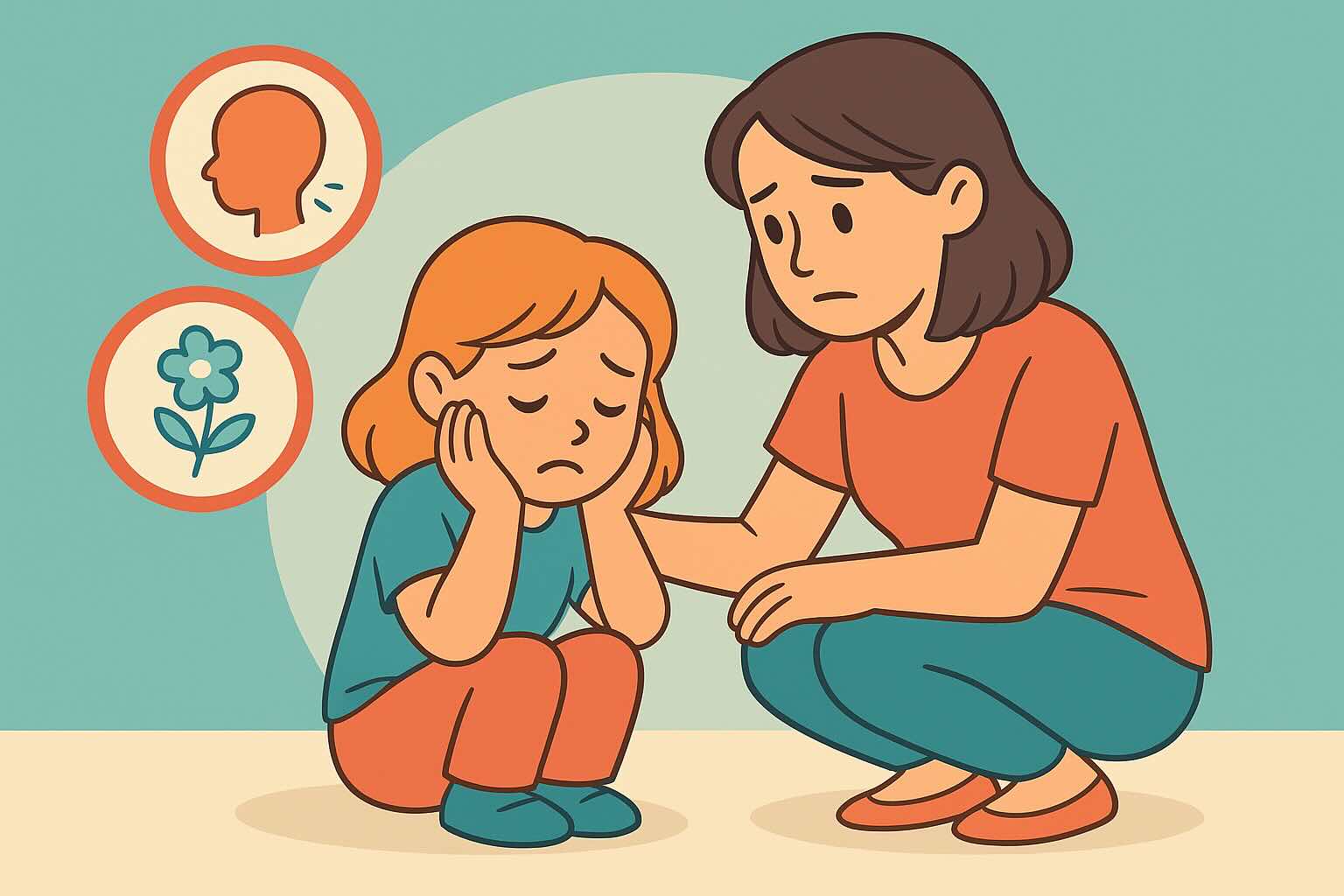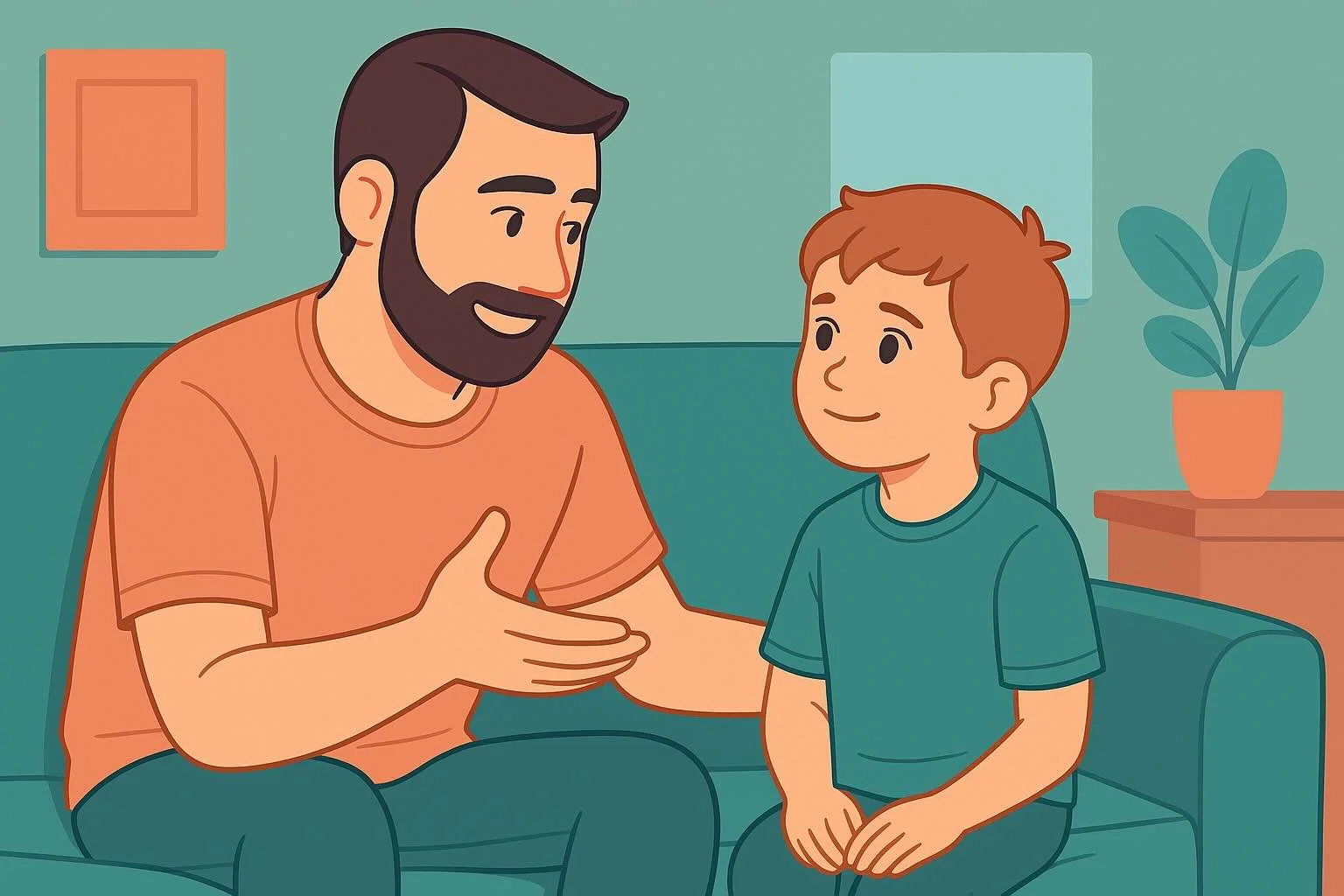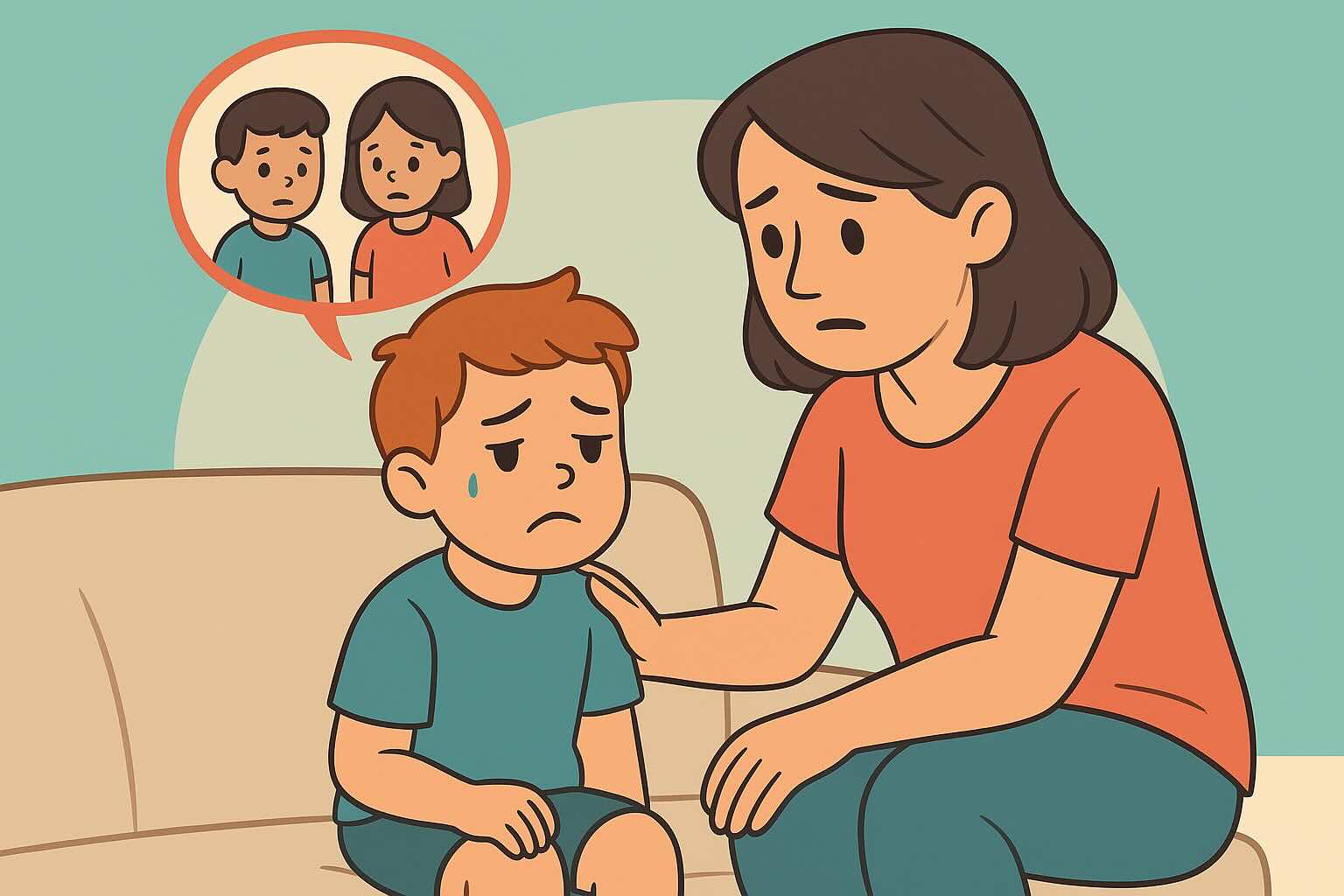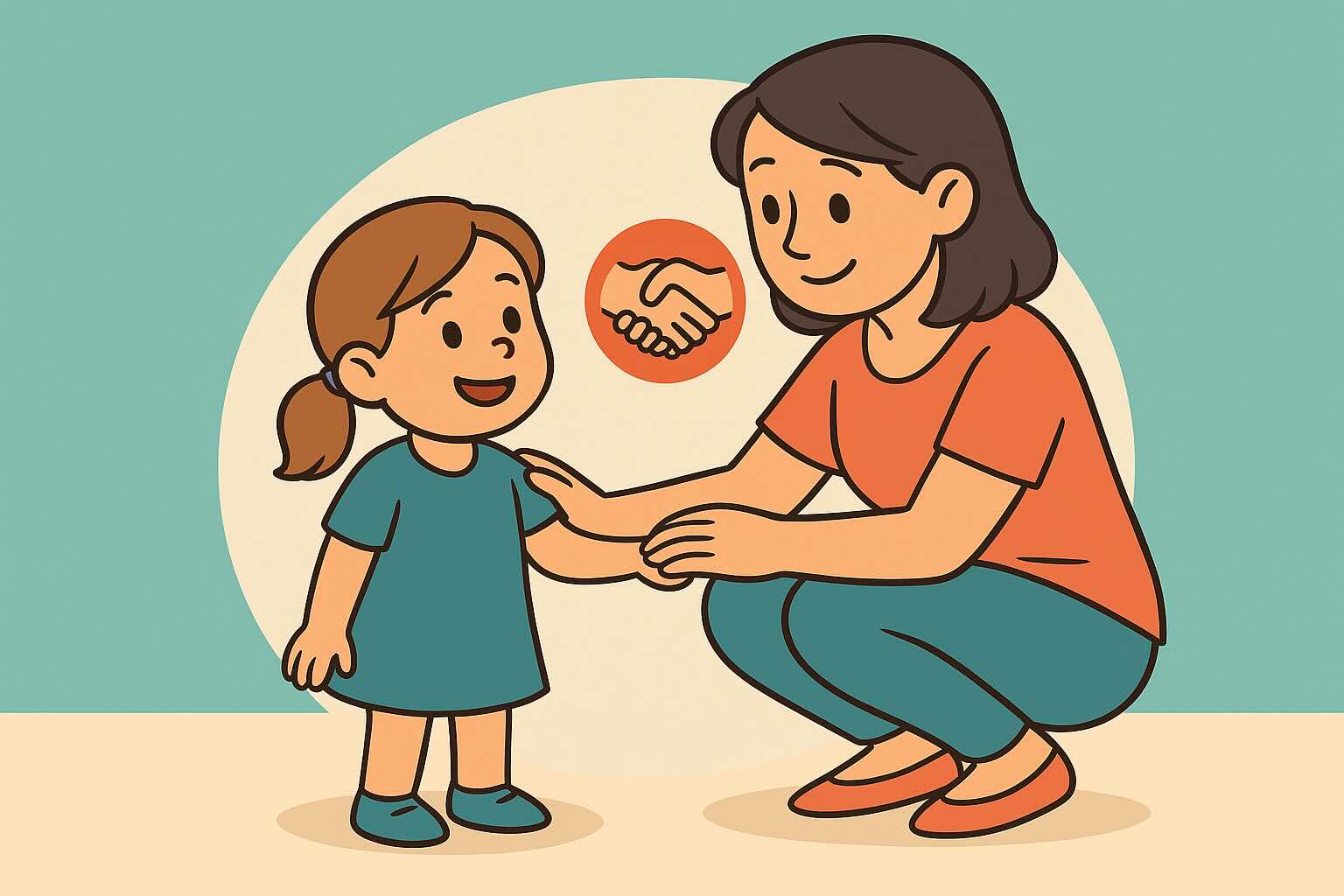The Sensitive Child: 7 Gentle Confidence-Building Strategies


The Sensitive Child: Complete Parent's Guide to Raising Cautious, Thoughtful Kids (Ages 3-7)
Building Confidence Without Forcing Bravery
If your child hides behind your legs at every social gathering and says "no" to most new experiences, you're probably wondering how to help them without making things worse. The good news? Sensitivity and caution are actually valuable traits that just need the right kind of nurturing.
Your sensitive child isn't broken or wrong—they simply experience the world more intensely and need more time to feel safe. With the right approach, you can help them develop confidence and social skills while honoring their thoughtful nature.
This comprehensive guide provides gentle, evidence-based strategies specifically designed for sensitive, cautious children aged 3-7. No forcing, no pushing—just patient, supportive methods that actually work with your child's temperament instead of against it.
To understand your child's overall temperament pattern, start with our personality identification guide. You may also find it helpful to compare with our guides on cooperative children and spirited children. For sensitive children facing social challenges, our social misunderstandings guide offers additional support. If your sensitive child's caution manifests as bedtime fears, our bedtime fears and anxiety guide provides specialized strategies for nighttime worries and monster fears.
What You'll Learn in This Guide
- Understanding Your Sensitive Child - Why they react this way and what they need to feel safe
- The Preparation Strategy - How to set them up for success in new situations
- The Gentle Exposure Method - Building confidence without overwhelming them
- Social Skills for Thoughtful Kids - Age-appropriate friendship and interaction skills
- Supporting Without Rescuing - When to help and when to step back
- Building Inner Confidence - Developing their sense of capability and worth
- Long-Term Success - Helping sensitivity become a strength, not a limitation
Estimated reading time: 11 minutes
Understanding Your Sensitive Child: The Thoughtful Temperament
The Sensitive Personality Profile
Your sensitive child processes the world differently from birth. They notice details others miss, feel emotions more deeply, and need more time to adapt to changes. This isn't a flaw—it's a different way of being in the world that comes with both challenges and gifts.
Common sensitive child characteristics:
- Slow to warm up to new people, places, or activities
- Uses "no" frequently to avoid unfamiliar experiences
- Clings to parents in social situations
- Observes carefully before participating
- Has strong reactions to unexpected events
- Prefers familiar routines and environments
- Shows heightened awareness of others' emotions
- Takes longer to recover from overstimulation
Why Your Child Responds with Caution
Neurological differences:
- Heightened sensitivity: Their nervous system processes stimuli more intensely
- Caution system: Their brain prioritizes safety over exploration
- Processing time: They need longer to assess and adapt to new situations
- Emotional depth: They feel emotions more strongly and for longer periods
It's important to understand: This isn't about you being overprotective or your child being "difficult." Sensitive children have a different neurological makeup that makes them naturally more cautious and thoughtful.
The Hidden Strengths of Sensitive Children
Before focusing on challenges, let's recognize your sensitive child's natural gifts:
Emotional and social strengths:
- Deep empathy and concern for others
- Strong observation and listening skills
- Thoughtful decision-making abilities
- Loyalty and deep friendships when formed
- Creativity and rich inner life
- Conscientiousness and rule-following
- Ability to notice details others miss
Future advantages: Research shows that sensitive, cautious children often become:
- Compassionate, caring adults
- Excellent listeners and counselors
- Careful, thoughtful decision-makers
- Creative artists and writers
- Dedicated, loyal friends and partners
- Conscientious, reliable employees
- Leaders who consider others' needs
The Parent Response: Supporting Without Rescuing
Why Sensitive Children Trigger Protective Instincts
Watching your thoughtful child struggle socially can trigger intense urges to jump in and rescue them. You might find yourself:
Over-protecting responses:
- Speaking for them in social situations
- Removing them from challenges immediately
- Making excuses for their behavior
- Avoiding social situations altogether
- Doing things for them they could do themselves
Pushing responses:
- Forcing participation in activities
- Comparing them to braver children
- Dismissing their caution as "silly"
- Pushing them into situations before they're ready
- Using shame or pressure to motivate them
Finding the Balance: Gentle Support
Your sensitive child needs support that validates their feelings while building their confidence to face challenges.
Supportive approaches:
- Acknowledge their feelings without dismissing them
- Prepare them for new situations in advance
- Stay nearby but allow them to engage at their pace
- Celebrate small brave moments
- Model confidence in handling new situations
- Provide choices to give them some control
Helpful mindset shifts:
- From "They need to get over this" to "They need time to feel safe"
- From "They're being difficult" to "They're being careful"
- From "I must fix this" to "I can support their growth"
- From "They should be like other kids" to "They have their own timeline"
The Preparation Strategy: Setting Them Up for Success
The Power of Advance Preparation
Sensitive children thrive when they know what to expect. Preparation helps them feel safer and more in control, reducing their anxiety about new situations.
The preparation framework:
- Facts: What will happen, where, when, and who will be there
- Feelings: Validation that nervous feelings are normal and okay
- Coping plan: Specific strategies they can use if they feel overwhelmed
- Connection: Reassurance of your support and presence
Preparing for Social Events
Example: Birthday party preparation
Step 1 - Facts (2-3 days before): "We're going to Sarah's birthday party on Saturday. It's at her house, and there will be about 6 kids there plus some parents. There might be games, cake, and singing happy birthday."
Step 2 - Feelings validation: "You might feel a little cautious or nervous when we first get there. That's completely okay and normal. Lots of people feel that way in new situations."
Step 3 - Coping plan: "If you feel nervous, you can stay close to me at first. You can watch the other kids play until you feel ready to join. We can also think of some things you might say to other kids, like 'Happy birthday, Sarah' or 'I like your decorations.'"
Step 4 - Connection reassurance: "I'll be there the whole time, and we can leave together when you're ready. There's no pressure to do anything that feels too overwhelming."
Preparing for New Activities
Example: First swim class preparation
Step 1 - Facts: "Your swim class starts next week. There will be a teacher named Miss Emma who will be in the water with you. I'll be sitting right where you can see me. The pool is warm and not very deep."
Step 2 - Feelings validation: "It might feel overwhelming to try something new, especially getting in the water with someone you don't know yet. Those cautious feelings make sense."
Step 3 - Coping plan: "If you feel nervous, you can look at me and I'll wave and give you thumbs up. You can tell Miss Emma if you need a minute to get comfortable. We can practice some of the things you might do, like blowing bubbles in the bathtub."
Step 4 - Connection reassurance: "Even if it feels hard, we'll try it together. I believe you can do it, and I'll be right there supporting you."
Day-of-Event Support
On the way to events, briefly review:
- What you discussed about what to expect
- The coping strategies they can use
- Your presence and support
- That there's no pressure to be "brave"
Arrival strategies:
- Arrive a few minutes early to avoid rushing
- Find a quiet spot to observe first
- Point out familiar things or people
- Use their senses to get oriented: "What do you see? What do you hear?"
- Stay calm and patient yourself
The Gentle Exposure Method: Building Confidence Gradually
Understanding Gradual Exposure
The goal isn't to eliminate your child's cautious responses but to help them learn they can handle challenging situations. This happens through gentle, repeated exposure that builds confidence over time.
Principles of gentle exposure:
- Start with less threatening situations
- Allow them to observe before participating
- Respect their pace and timing
- Provide support without taking over
- Celebrate small steps forward
- Expect setbacks and regression
Creating Successful Social Experiences
Start small and build up:
- One-on-one playdates before group activities
- Familiar settings before new environments
- Shorter activities before longer commitments
- Known children before meeting new friends
- Low-key activities before high-energy events
Example progression for social comfort:
- Week 1: Friend comes to your house for 1 hour
- Week 2: Visit friend's house for 1 hour
- Week 3: Small playgroup (3-4 kids) at familiar location
- Week 4: Larger group activity with preparation
- Week 5: New activity with familiar friends
- Ongoing: Continue building on successes
Supporting During the Experience
Your role during social activities:
- Stay nearby but don't hover
- Resist the urge to speak for them
- Acknowledge their efforts, not just outcomes
- Provide gentle encouragement without pressure
- Model calm, friendly behavior
- Step in only if they're truly overwhelmed
Helpful phrases during activities:
- "Take your time. You can join when you're ready."
- "I see you watching how they play. That's smart."
- "You're doing great just being here."
- "Would you like to sit with me for a few more minutes?"
- "I'm proud of you for trying something new."
When Your Child Doesn't Participate
If they don't join in activities:
- Don't force participation or make excuses
- Acknowledge their choice: "You decided to watch today. That's okay."
- Point out what they did accomplish: "You came and stayed the whole time."
- Avoid future threats: "Next time you have to play with the other kids."
- Plan for next time: "What might help you feel more comfortable next time?"
Remember: Observation IS participation for sensitive children. They're learning social skills by watching, even when they're not actively involved.
Social Skills Development for Sensitive Children
Understanding Their Social Challenges
Sensitive children face unique social difficulties that aren't about lacking social interest but about feeling safe enough to engage.
Common social challenges:
- Difficulty initiating conversations or play
- Hanging back while others engage
- Being overlooked by more assertive children
- Feeling overwhelmed in group settings
- Taking longer to form friendships
- Appearing unfriendly when they're actually just cautious
Teaching Social Skills Through Practice
Start social skills practice at home in low-pressure settings:
Conversation starters:
- Practice simple greetings: "Hi, I'm [name]"
- Share interests: "I like your [toy/shirt/etc.]"
- Ask about others: "What's your favorite [game/animal/color]?"
- Make observations: "That looks fun" or "You're really good at that"
Joining activities:
- Practice asking: "Can I play too?"
- Suggest alternatives: "Can I watch first?"
- Offer contributions: "I have an idea" or "Can I help?"
- Handle rejection gracefully: "Okay, maybe later"
Role-Playing Social Scenarios
Use dolls, stuffed animals, or pretend play to practice social situations:
Common scenarios to practice:
- Meeting a new child at the playground
- Joining a game that's already started
- Handling when someone says no to playing
- Asking for help from a teacher or adult
- Standing up for themselves kindly
- Making mistakes and trying again
Make practice fun and non-threatening:
- Use humor and silly voices
- Let them control the story sometimes
- Practice multiple outcomes for the same situation
- Focus on trying, not perfect execution
- Celebrate their ideas and creativity
Building Friendship Skills
Help your sensitive child understand friendship:
What makes a good friend:
- Being kind and caring
- Sharing and taking turns
- Listening to others
- Including others in play
- Being loyal and trustworthy
- Having fun together
Friendship conversation starters:
- "What do you look for in a friend?"
- "How do you show someone you want to be their friend?"
- "What would you do if a friend was feeling sad?"
- "How do you handle it when friends disagree?"
Facilitating friendships:
- Arrange one-on-one playdates with gentle children
- Choose activities your child enjoys and feels confident doing
- Start with shorter visits and build up
- Stay available but give them space to interact
- Help them find children with similar interests and temperaments
Age-Specific Strategies for Sensitive Children
Ages 3-4: The Foundation Years
At this age, sensitive children are just beginning to understand social relationships and need lots of support and patience.
Effective strategies:
- Keep social experiences short and simple
- Allow extra time for transitions
- Use comfort objects for security
- Create predictable routines
- Practice social skills through pretend play
Common challenges and solutions:
- Separating from parents: Start with very short separations in familiar places
- Playing with peers: Arrange parallel play opportunities before interactive play
- New environments: Visit new places when they're less crowded first
- Following instructions: Give one simple direction at a time with visual cues
Ages 5-7: Building Independence
Older sensitive children can understand more about social expectations while still needing significant support.
Effective strategies:
- Explain social expectations clearly
- Role-play more complex social scenarios
- Help them identify trusted adults in new settings
- Teach specific phrases for common social situations
- Celebrate their growing independence
Common challenges and solutions:
- School anxiety: Visit the classroom before school starts, meet the teacher
- Group activities: Help them find their role in group dynamics
- Playground navigation: Practice playground social skills and rules
- Standing up for themselves: Teach assertiveness without aggression
Handling Specific Sensitive Behaviors
The Clinging Child
When your child won't leave your side:
Immediate strategies:
- Stay calm and don't show frustration
- Acknowledge their need: "You want to stay close to me right now"
- Offer comfort while encouraging small steps: "You can hold my hand while we watch"
- Point out interesting things happening: "Look at what those kids are doing"
- Gradually increase small distances: "I'll be right here while you look at those toys"
Building independence gradually:
- Practice brief separations at home
- Create "brave moments" throughout the day
- Use transitional objects (special toy or photo)
- Establish check-in signals (wave, thumbs up)
- Celebrate increasing independence
The Silent Observer
When your child watches but won't participate:
Respect their process:
- Don't force verbal interactions
- Acknowledge their observation: "You're learning a lot by watching"
- Provide running commentary: "It looks like they're building a tower"
- Suggest simple ways to participate: "You could hand them blocks"
- Be patient with their timeline
Encourage gradual participation:
- Start with non-verbal participation (clapping, nodding)
- Practice responses to common questions at home
- Use activities that don't require talking (art, building)
- Celebrate any form of engagement
The "No" Child
When your child automatically says no to everything:
Understanding the "no":
- Recognize that "no" often means "I need time to feel safe"
- Don't take the rejection personally
- Avoid immediate arguing or convincing
- Give them time to process the option
For families where the sensitive child's "no" responses create ongoing power struggles, our managing power struggles guide offers strategies for transforming resistance into collaboration while respecting your child's cautious nature.
Gentle persistence:
- Offer choices: "Would you like to try this or that?"
- Use "when" instead of "if": "When you're ready, you can join"
- Break activities into smaller steps: "You could just watch for now"
- Respect genuine "no" while encouraging openness
Building Inner Confidence and Self-Worth
Recognizing and Celebrating Courage
Help your sensitive child recognize their brave moments:
Types of courage to acknowledge:
- Trying something new, even if they didn't finish
- Speaking to someone new, even quietly
- Staying in a situation that felt challenging
- Making a mistake and trying again
- Standing up for themselves or others
- Expressing their feelings or needs
Celebration language:
- "I noticed you tried something that felt challenging"
- "You stayed even when it felt hard"
- "You used your words to tell me how you felt"
- "You were brave in your own way today"
- "I saw you being kind to someone who looked sad"
Developing Their Unique Strengths
Help your child recognize what makes them special:
Sensitivity as strength:
- "You notice things others miss"
- "You're really good at understanding how people feel"
- "You think carefully before making decisions"
- "You're a caring, thoughtful person"
- "You make deep, meaningful friendships"
Building on their interests:
- Support activities they feel passionate about
- Help them become "experts" in their areas of interest
- Use their interests as bridges to social connections
- Celebrate their unique perspective and ideas
Creating Success Experiences
Design opportunities for your child to succeed:
Low-pressure success opportunities:
- Activities they're already good at
- One-on-one interactions with familiar people
- Helping others (reading to younger children, caring for pets)
- Creative expression (art, music, storytelling)
- Contributing to family activities in meaningful ways
Building competence:
- Teach life skills they can master
- Give them meaningful responsibilities
- Allow them to help others
- Recognize their contributions to family and friends
- Help them see their growth over time
When Gentle Support Isn't Enough
Recognizing When Professional Help Is Needed
While most sensitive children benefit from patient, supportive parenting, some may need additional help.
Signs that warrant professional consultation:
- Extreme anxiety responses that interfere with daily functioning
- Panic attacks or physical symptoms of anxiety
- Complete avoidance of all social situations for months
- Regression in previously mastered social skills
- Inability to separate from parents for any activities
- Persistent sleep or eating difficulties related to anxiety
- Family functioning significantly impacted for over 6 months
For sensitive children whose anxiety extends beyond social situations to include generalized worry patterns, our childhood anxiety complete guide provides comprehensive anxiety management strategies that complement temperament-based approaches.
Types of Professional Support
Child therapists: Specialize in anxiety and social skills training Play therapists: Use play-based approaches for younger children School counselors: Provide support in educational settings Occupational therapists: Address sensory processing issues Pediatricians: Rule out any medical causes of anxiety Family therapists: Help with family dynamics and parenting approaches
Working with Schools and Caregivers
Advocating for your sensitive child:
- Share information about their temperament and needs
- Suggest accommodations that support their success
- Request gradual transitions and preparation time
- Ask for understanding and patience from teachers
- Collaborate on strategies that work across settings
Long-Term Success: Sensitivity as a Strength
What Healthy Development Looks Like
Success for a sensitive child doesn't mean becoming outgoing or fearless. Instead, healthy development includes:
Emotional progress:
- Developing coping strategies for challenging situations
- Building relationships with a few trusted friends
- Expressing their needs and feelings appropriately
- Recovering more quickly from overwhelming experiences
- Showing pride in their accomplishments
Social development:
- Forming deep, meaningful friendships
- Contributing to group activities in their own way
- Standing up for themselves and others when needed
- Showing empathy and consideration for others
- Finding their place in social groups
Self-confidence:
- Recognizing their strengths and abilities
- Trying new things at their own pace
- Asking for help when needed
- Making decisions based on their values
- Feeling proud of their sensitive, caring nature
The Gift of a Sensitive Child
Your sensitive child's thoughtfulness is a gift to the world. Their caution, empathy, and consideration are qualities our society needs more of.
Long-term strengths they're developing:
- Deep emotional intelligence and empathy
- Careful, thoughtful decision-making skills
- Strong moral compass and sense of justice
- Ability to form deep, lasting relationships
- Creative and artistic abilities
- Conscientiousness and reliability
- Leadership that considers others' needs
Key Takeaways: Your Sensitive Child Success Guide
- ✅ Sensitive behavior is temperament, not a flaw - it's how they're naturally wired
- ✅ Preparation reduces anxiety - facts, feelings, coping plans, and connection
- ✅ Gentle exposure builds confidence - respect their pace and timing
- ✅ Observation IS participation - watching is how they learn social skills
- ✅ Small steps deserve celebration - acknowledge courage in all its forms
- ✅ Sensitivity is a strength - help them see their gifts, not just challenges
- ✅ Professional help is available - when behaviors significantly impact functioning
- ✅ Success looks different - deep friendships matter more than popularity
- ✅ Their timeline is their own - comparison steals joy and confidence
- ✅ Empathy and thoughtfulness are gifts - the world needs their gentle spirits
Remember: You're not trying to change your child's sensitive nature—you're helping them develop confidence and skills while honoring who they are. Their caution and empathy are strengths that will serve them well throughout life.
This guide is based on research in child temperament and developmental psychology. Individual results may vary based on child's specific needs, family circumstances, and consistency of approach. Always consult with professionals if you have concerns about your child's emotional or social development.
Expert Content Library
Access multimedia resources, articles, and expert-reviewed content organized by topics and your child's age.

Social Skills Toolkit
Help your child navigate social challenges with resilience-building strategies, perspective-taking tools, and friendship skills.
Frequently Asked Questions
Need personalized support?
RootWise's AI coach can provide tailored strategies for your specific situation, available 24/7 when you need it most.
Learn More About AI Coaching →



